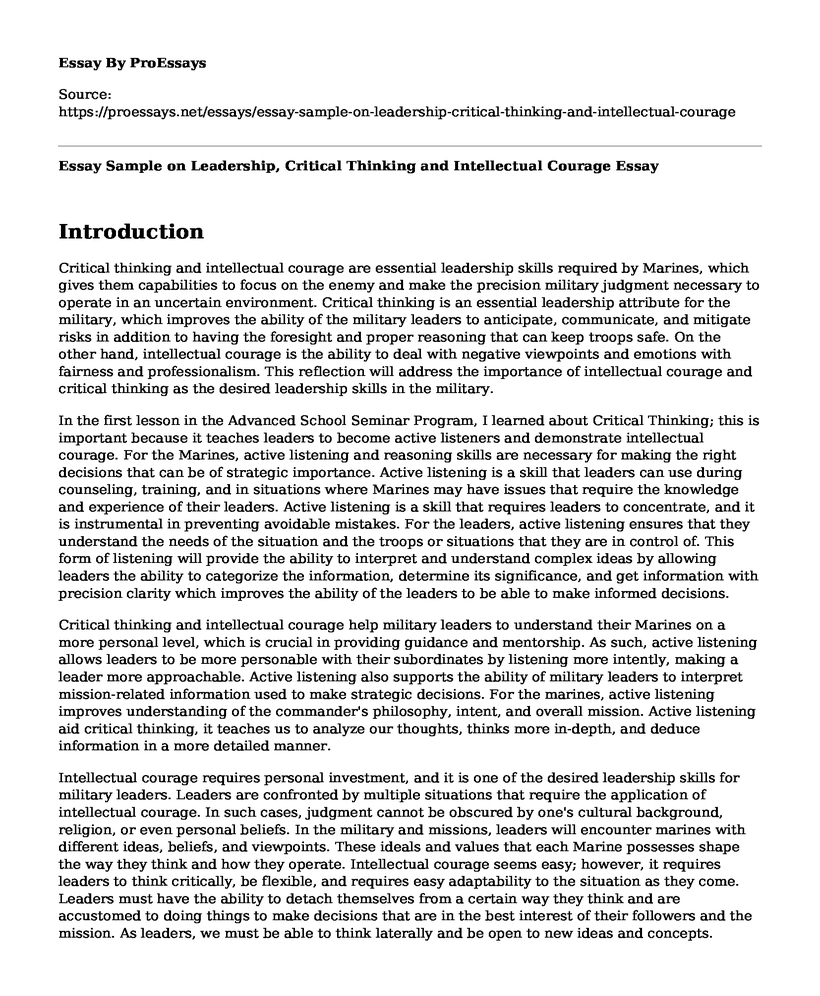Introduction
Critical thinking and intellectual courage are essential leadership skills required by Marines, which gives them capabilities to focus on the enemy and make the precision military judgment necessary to operate in an uncertain environment. Critical thinking is an essential leadership attribute for the military, which improves the ability of the military leaders to anticipate, communicate, and mitigate risks in addition to having the foresight and proper reasoning that can keep troops safe. On the other hand, intellectual courage is the ability to deal with negative viewpoints and emotions with fairness and professionalism. This reflection will address the importance of intellectual courage and critical thinking as the desired leadership skills in the military.
In the first lesson in the Advanced School Seminar Program, I learned about Critical Thinking; this is important because it teaches leaders to become active listeners and demonstrate intellectual courage. For the Marines, active listening and reasoning skills are necessary for making the right decisions that can be of strategic importance. Active listening is a skill that leaders can use during counseling, training, and in situations where Marines may have issues that require the knowledge and experience of their leaders. Active listening is a skill that requires leaders to concentrate, and it is instrumental in preventing avoidable mistakes. For the leaders, active listening ensures that they understand the needs of the situation and the troops or situations that they are in control of. This form of listening will provide the ability to interpret and understand complex ideas by allowing leaders the ability to categorize the information, determine its significance, and get information with precision clarity which improves the ability of the leaders to be able to make informed decisions.
Critical thinking and intellectual courage help military leaders to understand their Marines on a more personal level, which is crucial in providing guidance and mentorship. As such, active listening allows leaders to be more personable with their subordinates by listening more intently, making a leader more approachable. Active listening also supports the ability of military leaders to interpret mission-related information used to make strategic decisions. For the marines, active listening improves understanding of the commander's philosophy, intent, and overall mission. Active listening aid critical thinking, it teaches us to analyze our thoughts, thinks more in-depth, and deduce information in a more detailed manner.
Intellectual courage requires personal investment, and it is one of the desired leadership skills for military leaders. Leaders are confronted by multiple situations that require the application of intellectual courage. In such cases, judgment cannot be obscured by one's cultural background, religion, or even personal beliefs. In the military and missions, leaders will encounter marines with different ideas, beliefs, and viewpoints. These ideals and values that each Marine possesses shape the way they think and how they operate. Intellectual courage seems easy; however, it requires leaders to think critically, be flexible, and requires easy adaptability to the situation as they come. Leaders must have the ability to detach themselves from a certain way they think and are accustomed to doing things to make decisions that are in the best interest of their followers and the mission. As leaders, we must be able to think laterally and be open to new ideas and concepts.
The ability to reshape ideas and plans as a leader is critical. It requires intellectual courage for leaders to swallow their pride and take recommendations regardless of the position of the person giving counsel. This trait not only demonstrates humility but demonstrates that as a leader of Marines, you are open to ideas and are willing to listen and give serious consideration to the views of one's subordinates. It teaches Marines that as leaders, we are not above good ideas and that we will consider input made by others to better the plan and meet the mission goals. I have also learned that leaders who are not willing to take advice or the input from colleagues possess a toxic trait and intellectual cowardice, which can negatively affect teamwork and cooperation. Leaders who lack intellectual courage make all changes seem like a personal affair and feel the need to defend rather than adjust to accommodate the views of other people.
Conclusion
In conclusion, critical thinking is a process that deals with the way we think, it creates a standard for thought and requires leaders to consider good ideas that support mission success. This is important because it teaches leaders to become active listeners and demonstrate high intellectual courage.Cite this page
Essay Sample on Leadership, Critical Thinking and Intellectual Courage. (2022, Mar 10). Retrieved from https://proessays.net/essays/essay-sample-on-leadership-critical-thinking-and-intellectual-courage
If you are the original author of this essay and no longer wish to have it published on the ProEssays website, please click below to request its removal:
- Is Going to College Worth It? - Essay Sample
- Paper Example on Positive Benefits of Family Engagement in the Early Childhood Program
- Mental Models and Theory of Constraints in Perception Paper Example
- Paper Example on Project Management: Tech Implementation for Cost Reduction & Growth
- Essay Sample on Asia's Corrupt Practices: 16 Countries Fight for Sustainable Development
- Essay Example on Competing Theories of Decision-Making: Plato vs Sun Tzu
- Essay Example on Promoting Healthy Weights: Parent & School Interventions







